#Scientology blog
Text

Is Hayley Atwell outing herself as an ungrateful asshole, too? Nice job. Just go out with Cruise and leave us alone. That's the best you'll get.
Update:

I must have been right. It's been nonstop shitting in the tags on Twitter from the likes of Rightwingers, Penske and COS. So Hayley IS in Scientology, isn't she? The rush to make her trend after my post, for no reason. I'll bet those blinds about Tom Cruise asking her out were plants to make her seem like an outsider. And that's why she'll say what they tell her to. It's always jarring when a celebrity says something off-brand. She was also very silent while Elizabeth Olsen beat up her character in Doctor Strange memes for months, so much cruelty as promo. Almost like she knew. She knew.
#British actresses doing hatchet work for COS and Britain#Hayley Atwell#Nobody went to see Doctor Strange to see you#Warner Bros Discovery#friends at Penske Media#Culture Crave#Scientology blog#25000 likes im one hour#Troll Farms#Hayley Atwell is a Scientologist
1 note
·
View note
Text
Goodnight to everyone except scientologists
To all scientologists seeing this,
Be aware I'm in your walls
#scientology#bpd mood#funny#im just a girl#girlhood#girly stuff#manic pixie dream girl#gaslight gatekeep girlboss#girl blogger#girl interupted syndrome#september11th2024#11:23pm#goodnight#bpd problems#bpd splitting#girlbloger#girlblogging#girly blog#girly girl#girly tumblr#tumblr milestone#tumblr girls#actually bpd#bpd#bpd safe#bpd feels#bpd stuff#bpd thoughts#bpd vent#girlcore
23 notes
·
View notes
Note
Thank you for opening my eyes to regdora 🙏
but of course, if i’m going to be weird and obsessive about something, i need to inflict others with my psychic visions as well 🫡
#organ donations#i sometimes like to think of my blog as the church of scientology of marauders tumblr#no one wants to go here and everything i say is insane#but wait is that tom cruise hold on they’ve got tom cruise over there ok hold up i need to check out the tom cruise#and then you’re stuck here#with my derangement
9 notes
·
View notes
Text

Fun fact, you can still go to the book store and just fucking buy books written by the founder the Scientology
4 notes
·
View notes
Text
Hey where did the post about that blog go?
Very good question.
I decided to take it down for two simple reasons: one, I've noticed that it has been circulated on other social media. Putting the people in those photos in that blog at risk of harassment.
I also made the error of using some of the photos (even if heavily censored) as evidence, so that probably put a target on some of the people and I should have definitely thought better of it.
People went looking for the users involved, asking very weird questions. Even disgusting questions. That was not the aim of my post. My post was supposed to be informative, not a target on the people involved. I'm sorry for having put people in an uncomfortable position, so I will take responsibility of that.
Second reason. I've been asked to take the post down by a person involved, who was recognized in one of the photos, even if I censored them, it was not enough. People tracked them down on that blog.
What I answered to them impulsively was that I still thought it was important for people to know, that I would just modify the post details and cancel the censored photos, to make it harder to track down the blog. But at this point it's more than clear what Neil Gaiman did, no one needs further proof. If and when more people will feel secure enough to talk about what happened to them, it will be on their own terms.
I have no means to stop people from harassing and disturbing those users. Doesn't matter if they regretted it or not, I realize now, it still isn't right to put them in a tight spot all of a sudden.
So after some reasoning, I agreed and took down the post down.
#For respect of those involved I'm taking it down#I was not forced or sued by Big Scientology or anything let it be clear.#I can't do much for the reblogs#so maybe don't circulate the post any further?#thanks for understanding#I don't have much time lately to keep track of what is going on on this blog.#It's another reason for why I took this decision.
3 notes
·
View notes
Text
I have gone down some really weird rabbitholes for this blog
#not a heritage post#highlights include a blog admin that admitted to not being into sk anymore then getting mad when asked why theykept running the blog#and a joey richter fanpage that posted about scientology once then never again
10 notes
·
View notes
Text

Rape tw but hell yeah!!!!!!!
4 notes
·
View notes
Text
Watch "SCIENTOLOGY EXPOSED By Protesters - "Destroy by Any Means Necessary" Blog Article Leaves Bad Taste" on YouTube
0 notes
Text
question
I know DMT rushes you when you have certain types of death such as asphyxiating (which I always thought the hangman in the occult pertained to) but does DMT still rush you when someone oveerdoses on pills? I'm curious about the various ways of dying and what kind of "vehicle" the soul gets afterwards depending on the method. I know DMT is associated with breathwork, which explains thhe hangman situation. But what about when its a softer death like an OD? Would the soul still get the "vehiicle"?
OPINIONS PLS
0 notes
Text
david miscavige probably watches sunny and thinks dennis is a good guy who everyone's too hard on
1 note
·
View note
Text
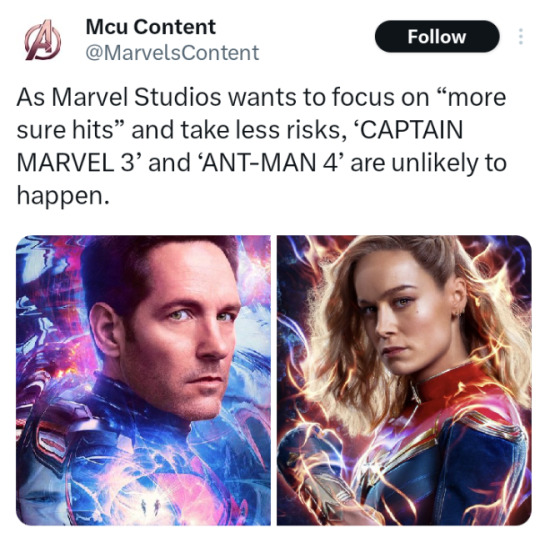

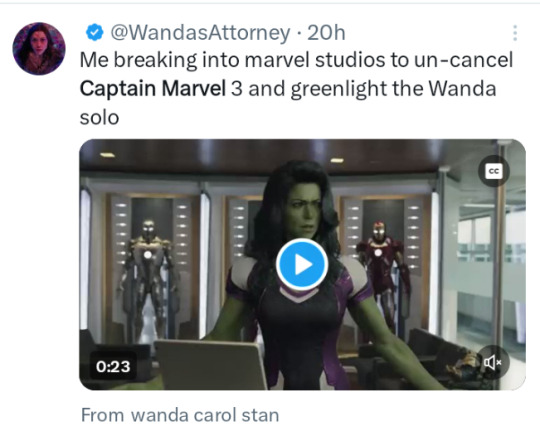

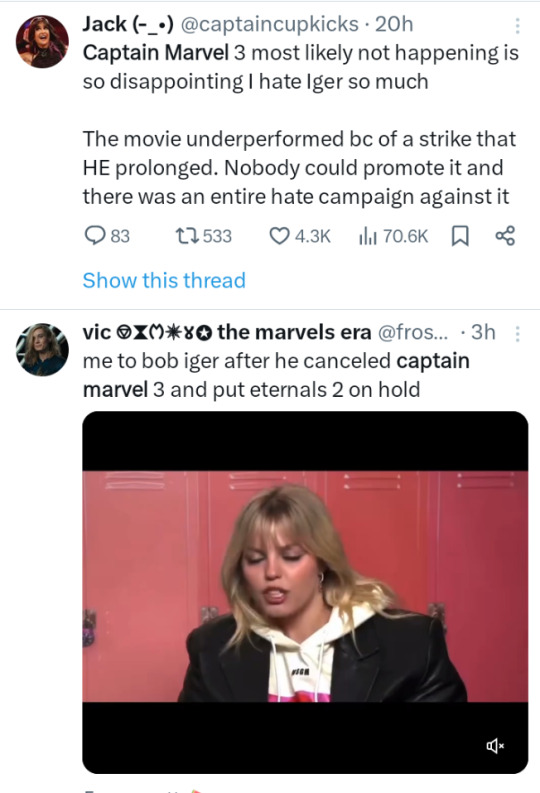
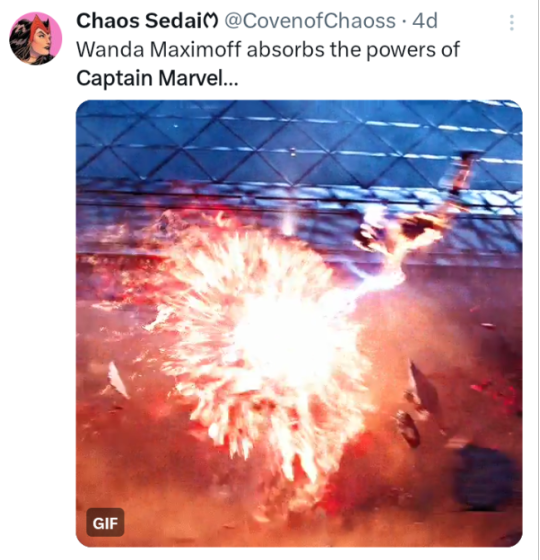

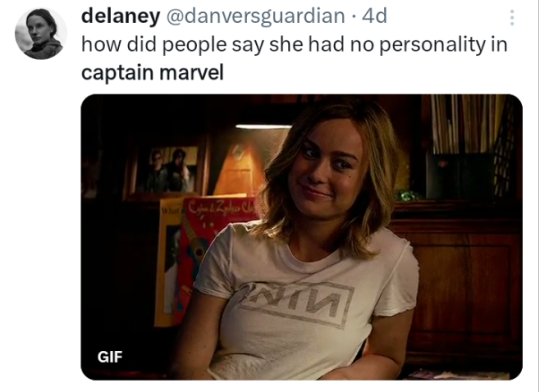
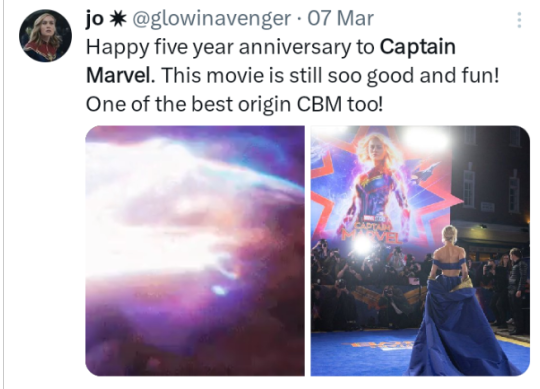

Translation: Now that we might actually lose Captain Marvel, the very same trolls (See competitors like Warner Bros Discovery, Sony Pictures and Paramount) are now whining about its demise and attempting to shame Marvel over it. I guess now that it seems the coup against the Disney board and Bob Iger is failing, these assholes are now realizing the money they could count on, for the actors they handle are drying up... because of them. Nice to finally admit that no, there was never anything wrong with the character and especially the first movie. It wasn't 'woke' as they kept screaming. It's perfectly fine to express frustration in how you're treated by the opposite sex. How many fucking Whine fests do we put up with about men who hate their mothers? About every other Ari Aster film, that's how much.
The other tell that this is coming from asshole competitors is the *YAWN!* obsession in pushing Wanda Maximoff. Better make that BRITISH ASSHOLE COMPETITORS.
#Ant Man#Captain Marvel#Disney Competitors Killed Carole Danvers#Wanda Maximoff#Elizabeth Olsen#British Lavender Mafia#Scientology#Warner Bros Discovery#Paramount Global#Sony Pictures#BBC#ITV#Ireland#China#This Might Also Kill New Avengers#Universal Puctures#IAC#Barry Diller#Ryan Seacrest#NFL#Silicon Valley Trolls#Sports Betting Blogs#John Cena
3 notes
·
View notes
Text
How a billionaire’s mediocre pump-and-dump “book” became a “bestseller”
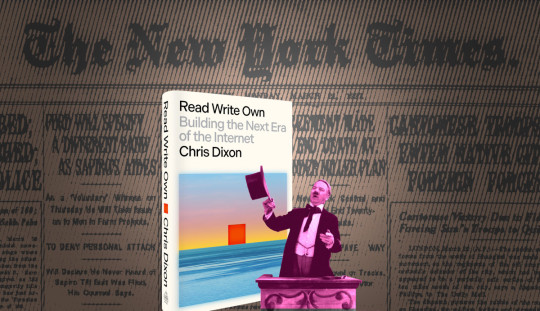
If you'd like an essay-formatted version of this post to read or share, here's a link to it on pluralistic.net, my surveillance-free, ad-free, tracker-free blog:
https://pluralistic.net/2024/02/15/your-new-first-name/#that-dagger-tho

I was on a book tour the day my editor called me and told me, "From now on, your middle name is 'Cory.'"
"That's weird. Why?"
"Because from now on, your first name is 'New York Times Bestselling Author.'"
That was how I found out I'd hit the NYT list for the first time. It was a huge moment – just as it has been each subsequent time it's happened. First, because of how it warmed my little ego, but second, and more importantly, because of how it affected my book and all the books afterwards.
Once your book is a Times bestseller, every bookseller in America orders enough copies to fill a front-facing display on a new release shelf or a stack on a bestseller table. They order more copies of your backlist. Foreign rights buyers at Frankfurt crowd around your international agents to bid on your book. Movie studios come calling. It's a huge deal.
My books became Times bestsellers the old-fashioned way: people bought and read them and told their friends, who bought and read them. Booksellers who enjoyed them wrote "shelf-talkers" – short reviews – and displayed them alongside the book.
That "From now on your first name is 'New York Times Bestselling Author' gag is a tradition. When @wilwheaton's memoir Still Just A Geek hit the Times list, I texted the joke to him and he texted back to say @jscalzi had already sent him the same joke (and of course, Scalzi and I have the same editor, Patrick Nielsen Hayden):
https://www.harpercollins.com/products/still-just-a-geek-wil-wheaton
But not everyone earns that first name the same way. Some people cheat.
Famously, the Church of Scientology was caught buying truckloads of L Ron Hubbard books (published by Scientology's own publishing arm) from booksellers, returning them to their warehouse, then shipping them back to the booksellers when they re-ordered the sold out titles. The tip-off came when booksellers opened cases of books and found that they already bore the store's own price-stickers:
https://www.latimes.com/local/la-scientology062890-story.html
The reason Scientology was willing to go to such great lengths wasn't merely that readers used "NYT Bestseller* to choose which books to buy. Far more important was the signal that this sent to the entire book trade, from reviewers to librarians to booksellers, who made important decisions about how many copies of the books to stock, whether to display them spine- or face out, and whether to return unsold stock or leave it on the shelf.
Publishers go to great lengths to send these messages to the trade: sending out fancy advance review copies in elaborate packaging, taking out ads in the trade magazines, featuring titles in their catalogs and sending their sales-force out to impress the publisher's enthusiasm on their accounts.
Even the advance can be a way to signal the trade: when a publisher announces that it just acquired a book for an eyebrow-raising sum, it's not trumpeting the size of its capital reserves – it's telling the trade that this book is a Big Deal that they should pay attention to.
(Of all the signals, this one may be the weakest, even if it's the most expensive for publishers to send. Take the $1.25m advance that Rupert Murdoch's Harpercollins paid to Sarah Palin for her unreadable memoir, Going Rogue. As with so many of the outsized sums Murdoch's press and papers pay to right wing politicians, the figure didn't represent a bet on the commercial prospects of the book – which tanked – but rather, a legal way to launder massive cash transfers from the far-right billionaire to a generation of politicians who now owe him some rather expensive favors.)
All of which brings me to the New York Times bestselling book Read Write Own by the billionaire VC New York Times Bestselling Author Chris Dixon. Dixon is a partner at A16Z, the venture capitalists who pumped billions into failed, scammy, cryptocurrency companies that tricked normies into converting their perfectly cromulent "fiat" money into shitcoins, allowing the investors to turn a massive profit and exit before the companies collapsed or imploded.
Read Write Own (subtitle: "Building the Next Era of the Internet") is a monumentally unconvincing hymn to the blockchain. As Molly White writes in her scathing review, the book is full of undisclosed conflicts of interest, with Dixon touting companies he has a direct personal stake in:
https://www.citationneeded.news/review-read-write-own-by-chris-dixon/
But this book's defects go beyond this kind of sleazy pump-and-dump behavior. It's also just bad. The arguments it makes for the blockchain as a way of escaping the problems of an enshittified, monopolized internet are bad arguments. White dissects each of these arguments very skillfully, and I urge you to read her review for a full list, but I'll reproduce one here to give you a taste:
After three chapters in which Dixon provides a (rather revisionistd) history of the web to date, explains the mechanics of blockchains, and goes over the types of things one might theoretically be able to do with a blockchain, we are left with "Part Four: Here and Now", then the final "Part Five: What's Next". The name of Part Four suggests that he will perhaps lay out a list of blockchain projects that are currently successfully solving real problems.
This may be why Part Four is precisely four and a half pages long. And rather than name any successful projects, Dixon instead spends his few pages excoriating the "casino" projects that he says have given crypto a bad rap,e prompting regulatory scrutiny that is making "ethical entrepreneurs … afraid to build products" in the United States.f
As White says, this is just not a good book. It doesn't contain anything to excite people who are already blockchain-poisoned crypto cultists – and it also lacks anything that will convince normies who never let Matt Damon or Spike Lee convince them to trade dollars for magic beans. It's one of those books that manages to be both paper and a paperweight.
And yet…it's a New York Times Bestseller. How did this come to pass? Here's a hint: remember how the Scientologists got L Ron Hubbard 20 consecutive #1 Bestsellers?
As Jordan Pearson writes for Motherboard, Read Write Own earned its place on the Times list because of a series of massive bulk orders from firms linked to A16Z and Dixon, which ordered between dozens and thousands of copies and gave them away to employees or just randos on Twitter:
https://www.vice.com/en/article/n7emkx/chris-dixon-a16z-read-write-own-nyt-bestseller
The Times recognizes this in a backhanded way, by marking Read Write Own on the list with a "dagger" (†) that indicates the shenanigans (the same dagger appeared alongside the listing for Donald Trump Jr's Triggered after the RNC spent a metric scientologyload of money – $100k – buying up cases of it):
https://www.nytimes.com/2019/11/21/books/donald-trump-jr-triggered-sales.html
There's a case for the Times not automatically ignoring bulk orders. Since 2020, I've run Kickstarters where I've pre-sold my books on behalf of my publisher, working with bookstores like Book Soup and wholesalers like Porchlight Books to backers when they go on sale. I signed and personalized 500+ books at Vroman's yesterday for backers who pre-ordered my next novel, The Bezzle:
https://www.flickr.com/photos/doctorow/53531243480/
But there's a world of difference between pre-orders that hundreds or thousands of readers place that are aggregated into a single bulk order, and books that are bought by CEOs to give away to people who may not have any interest in them. For the book trade – librarians, reviewers, booksellers – the former indicates broad interest that justifies their attention. The latter just tells you that a handful of deep-pocketed manipulators want you to think there's broad interest.
I'm certain that Dixon – like me – feels a bit of pride at having "earned" a new first name. But Dixon – like me – gets something far more tangible than a bit of egoboo out of making the Times list. For me, a place on the Times list is a way to get booksellers and librarians excited about sharing my book with readers.
For Dixon, the stakes are much higher. Remember that cryptocurrency is a faith-based initiative whose mechanism is: "convince normies that shitcoins will be worth more tomorrow than they are today, and then trade them the shitcoins that cost you nothing to create for dollars that they worked hard to earn."
In other words, crypto is a bezzle, defined by John Kenneth Galbraith as "The magic interval when a confidence trickster knows he has the money he has appropriated but the victim does not yet understand that he has lost it."
So long as shitcoins haven't fallen to zero, the bag-holders who've traded their "fiat" for funny money can live in the bezzle, convinced that their "investments" will recover and turn a profit. More importantly, keeping the bezzle alive preserves the possibility of luring in more normies who can infuse the system with fresh dollars to use as convincers that keep the bag-holders to keep holding that bag, rather than bailing and precipitating the zeroing out of the whole scam.
The relatively small sums that Dixon and his affiliated plutocrats spent to flood your podcasts with ads for this pointless 300-page Ponzi ad are a bargain, as are the sums they spent buying up cases of the book to give away or just stash in a storeroom. If only a few hundred retirees are convinced to convert their savings to crypto, the resulting flush of cash will make the line go up, allowing whales like Dixon and A16Z to cash out, or make more leveraged bets, or both. Crypto is a system with very few good trades, but spending chump change to earn a spot on the Times list (dagger or no) is a no-brainer.
After all, the kinds of people who buy crypto are, famously, the kinds of people who think books are stupid ("I would never read a book" -S Bankman-Fried):
https://www.washingtonpost.com/opinions/2022/11/29/sam-bankman-fried-reading-effective-altruism/
There's precious little likelihood that anyone will be convinced to go long on crypto thanks to the words in this book. But the Times list has enough prestige to lure more suckers into the casino: "I'm not going to read this thing, but if it's on the list, that means other people must have read it and think it's convincing."
We are living through a golden age of scams, and crypto, which has elevated caveat emptor to a moral virtue ("not your wallet, not your coins"), is a scammer's paradise. Stein's Law tells us that "anything that can't go on forever will eventually stop," but the purpose of a bezzle isn't to keep the scam going forever – just until the scammer can cash out and blow town. The longer the bezzle goes on for, the richer the scammer gets.
Not for nothing, my next novel – which comes out on Feb 20 – is called The Bezzle. It stars Marty Hench, my hard-driving, two-fisted, high-tech forensic accountant, who finds himself unwinding a whole menagerie of scams, from a hamburger-based Ponzi scheme to rampant music royalty theft to a vast prison-tech scam that uses prisoners as the ultimate captive audience:
https://us.macmillan.com/books/9781250865878/thebezzle
Patrick Nielsen Hayden – the same editor who gave me my new first name – once told me that "publishing is the act of connecting a text with an audience." Everything a publisher does – editing, printing, warehousing, distributing – can be separated from publishing. The thing a publisher does that makes them a publisher – not a printer or a warehouser or an editing shop – is connecting books and audiences.
Seen in this light, publishing is a subset of the hard problem of advertising, religion, politics and every other endeavor that consists in part of convincing people to try out a new idea:
https://pluralistic.net/2021/07/04/self-publishing/
This may be the golden age of scams, but it's the dark age of publishing. Consolidation in distribution has gutted the power of the sales force to convince booksellers to stock books that the publisher believes in. Consolidation in publishing – especially Amazon, which is both a publisher and the largest retailer in the country – has stacked the deck against books looking for readers and vice-versa (Goodreads, a service founded for that purpose, is now just another tentacle on the Amazon shoggoth). The rapid enshittification of social media has clobbered the one semi-reliable channel publicists and authors had to reach readers directly.
I wrote nine books during lockdown (I write as displacement activity for anxiety) which has given me a chance to see publishing in the way that few authors can: through a sequence of rapid engagements with the system as a whole, as I publish between one and three books per year for multiple, consecutive years. From that vantagepoint, I can tell you that it's grim and getting grimmer. The slots that books that connected with readers once occupied are now increasingly occupied by the equivalent of the botshit that fills the first eight screens of your Google search results: book-shaped objects that have gamed their way to the top of the list.
https://www.theguardian.com/commentisfree/2024/jan/03/botshit-generative-ai-imminent-threat-democracy
I don't know what to do about this, but I have one piece of advice: if you read a book you love, tell other people about it. Tell them face-to-face. In your groupchat. On social media. Even on Goodreads. Every book is a lottery ticket, but the bezzlers are buying their tickets by the case: every time you tell someone about a book you loved (and even better, why you loved it), you buy a writer another ticket.
Meanwhile, I've got to go get ready for my book tour. I'm coming to LA, San Francisco, Seattle, Vancouver, Calgary, Phoenix, Portland, Providence, Boston, New York City, Toronto, San Diego, Salt Lake City, Tucson, Chicago, Buffalo, as well as Torino and Tartu (details soon!).
If you want to get a taste of The Bezzle, here's an excerpt:
https://www.torforgeblog.com/2023/11/20/excerpt-reveal-the-bezzle-by-cory-doctorow/
And here's the audiobook, read by New York Times Bestselling Author Wil Wheaton:
https://archive.org/download/Cory_Doctorow_Podcast_459/Cory_Doctorow_Podcast_459_-_The_Bezzle_Read_By_Wil_Wheaton.mp3
#pluralistic#molly white#books#publishing#dunning kruggerands#crypto#cryptocurrency#a16z#venture capitalism#guillotine watch#this is why we can't have nice things#bookselling#the bezzle#bezzles#web3#blockchain
381 notes
·
View notes
Text
Was nobody going to tell me that Neil Gaiman's parents moved within a mile of the global Scientology HQs in the UK when Ron Hubbard was extremely still around & that they led the media charge against his enemies even as the cult got outlawed and L-Ronnieboy got declared Persona Non Grata & cuntpunted out the country??? And that then some horrible shit with a shady "suicide" happened and they interviewed Tiny Little Seven Year Old Scientologist Neil on the BBC as part of the associated public narrative cleanup???? And that as an adult he made his parents' lies into The Ocean at the End of the Lane????? Or was I supposed to learn about it from a random Facebook link to notorious ex-Scientologist whistleblower Mike Rinder's blog?
https://www.mikerindersblog.org/neil-gaimans-scientology-suicide-story/
#i gues The Algorithm knows I'm interested following The Shitshow around linkin park's new culty singer#viitalks#what the FUCK#neil gaiman#I'm still reading thru the post tho so like. grain of salt etc
49 notes
·
View notes
Text
I know I keep shitting up the tag being hyperfocused on this rn but there's a lot of very curious anon/burner account activity going on surrounding the case. And it's very tinfoil hat of me but hear me out. Neil has been an active internet user longer than many of his fans have been alive. He was a class VIII auditor for scientology in the 80's. He's also hired a pr company that's worked with some very nasty people to cover his ass. My point is that he should be quite familiar with information manipulation, especially where it comes to the internet. I don't think it's out of pocket to say that some of the strange defensive activity is intentionally coming from his end of the court to muddy the waters and scare people off from engaging with and talking about the situation openly.
My only advice is to not take obviously inflammatory anons or blogs seriously. I know it can be scary but you cannot allow these ghosts to direct the narrative.
54 notes
·
View notes
Note
I always wondered what it was about Hazbin Hotel and Helluva Boss that somehow brought out the worst in people.
I've seen post where other anons on this blog and others have pointed out that their friends or people they know would flip like a switch over night because of these shows, people who normally would not partake in internet drama or would tear a show like this a new on go full inquisition on people who don't like the shows or even have some criticism for the show in the slightest and defend these shows to the death.
What is it about these shows that turns people into assholes? Were they always like this but kept it under control and these shows somehow made them snap? Does something about these shows draw them to it like a moth to a flame and they refuse to admit that they are being burned? Did Vivziepop successfully manage to groom these people?
Seriously, the shows aren't that good but yet they somehow managed to attract a lot of people who will be willing to go to God knows what kind of lengths to defend these shows.
It's absolutely insane and also very sad. I don't know what causes it, but there's no reason why a fandom should being operating like Scientology.
34 notes
·
View notes
Text
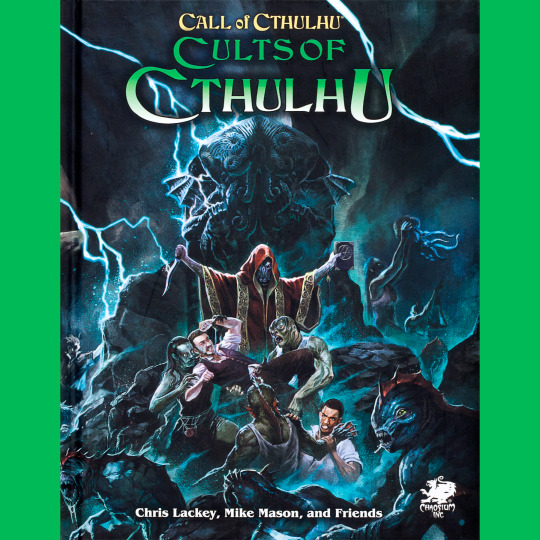
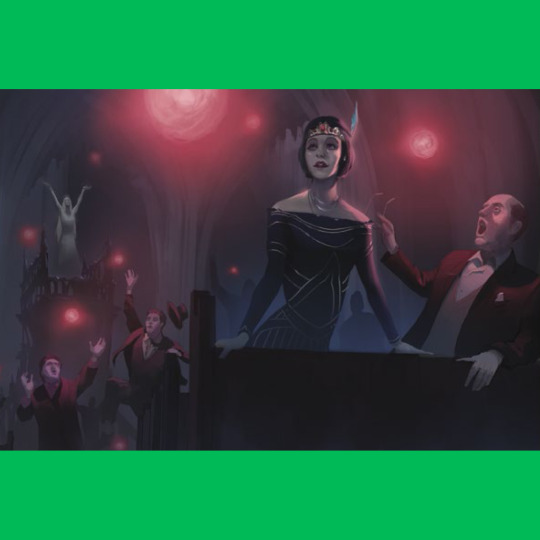
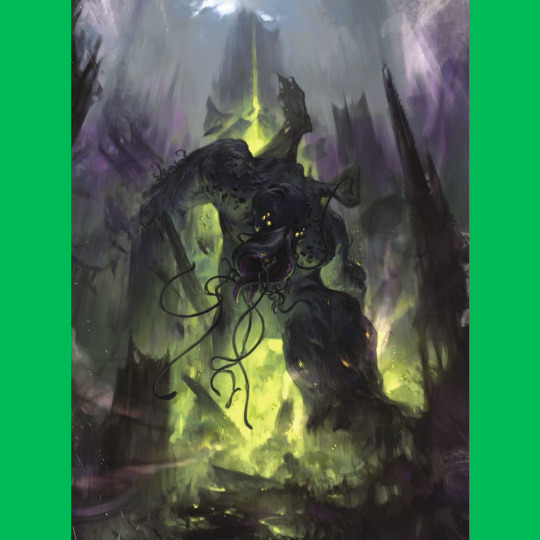
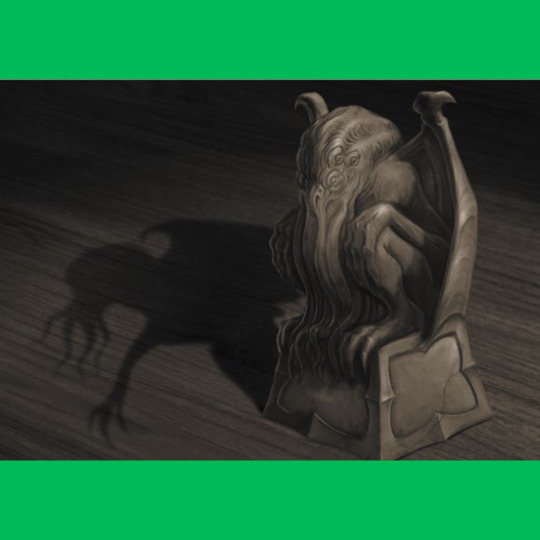

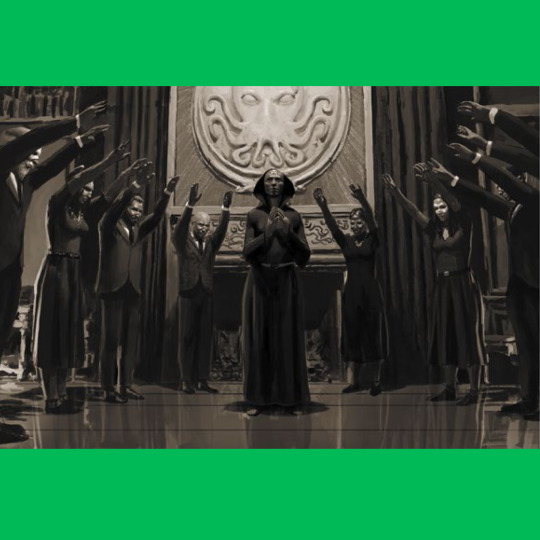

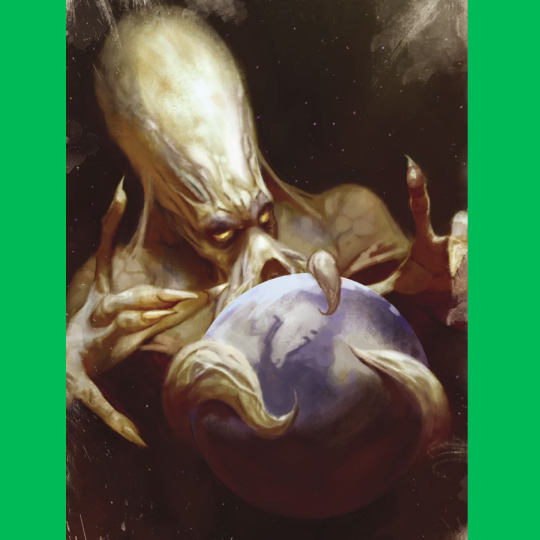
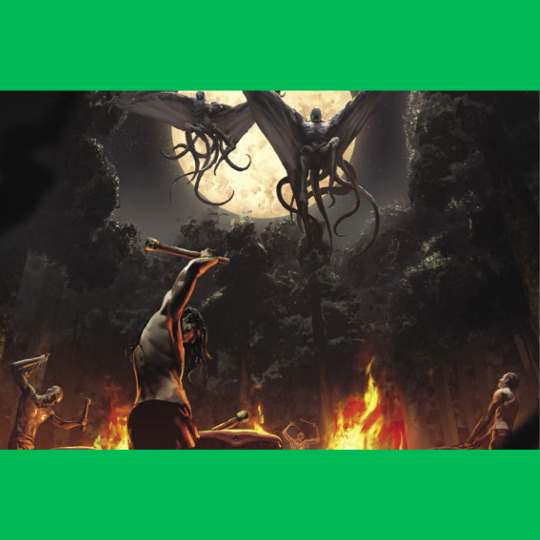
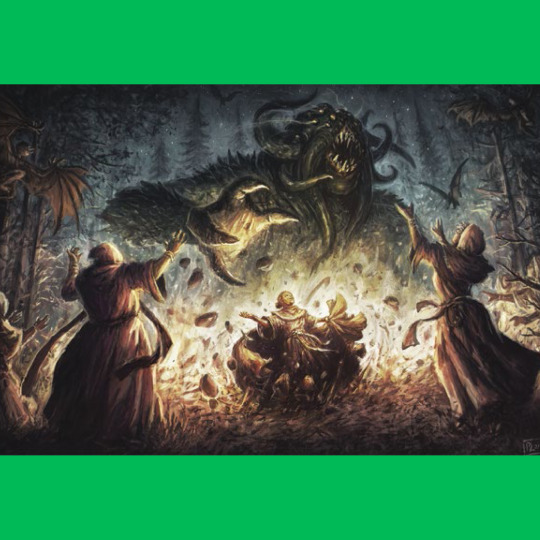
This is Cults of Cthulhu (2022), a fantastic and weirdly long overdue sourcebook for Call of Cthulhu (It’s a Call of Cthulhu kind of week!).
Why is it overdue? Well, Cthulhu is a pretty key part of the name of the game, but the big squid was really only featured in one adventure, the first CoC campaign, Shadows of Yog-Sothoth. Since then, if there is a prime antagonist of the CoC game writ large, its Nyarlathotep. That’s a cosmic entity who gets around.
With Cults of Cthulhu, we get the first serious and fairly exhaustive examination of the worldwide Cthulhu cult hinted at in Lovecraft’s story. The overview is provided in an in-universe style by two characters: Mildred Schwartz works off Professor Angell’s original research to provide a history of the cult from the dawn of history to 1930. David Eberhart’s blog builds on Schwartz’s timeline, detailing developments from the ‘30s to the present. This isn’t quite so thrilling to read as the Delta Green timeline, but it is certainly entertaining and feels a bit more usable for a game.
Following that, the book presents five cults in depth. There are two old ones, the Louisiana swamp cult and the Esoteric Order of Dagon, and three new ones, the Elevated Order of Morpheus (a Victorian occult club), the Society of the Angelic Ones (a California cult) and the Church of Perfect Science (a riff on Scientology). Those new ones are the subject of lengthy scenarios later in the book and have a thread connecting them that ends on a deliciously ambiguous note. There is also a robust guide to creating your own Cthulhu cults, something I feel like I could do indefinitely. All this is wrapped up in a handsome package, as well — I generally like Chaosium’s production values these days but this one feels a bit above their average in terms of art.
An instant classic, basically.
#roleplaying game#tabletop rpg#dungeons & dragons#rpg#d&d#ttrpg#Cults of Cthulhu#Call of Cthulhu#Chaosium
138 notes
·
View notes